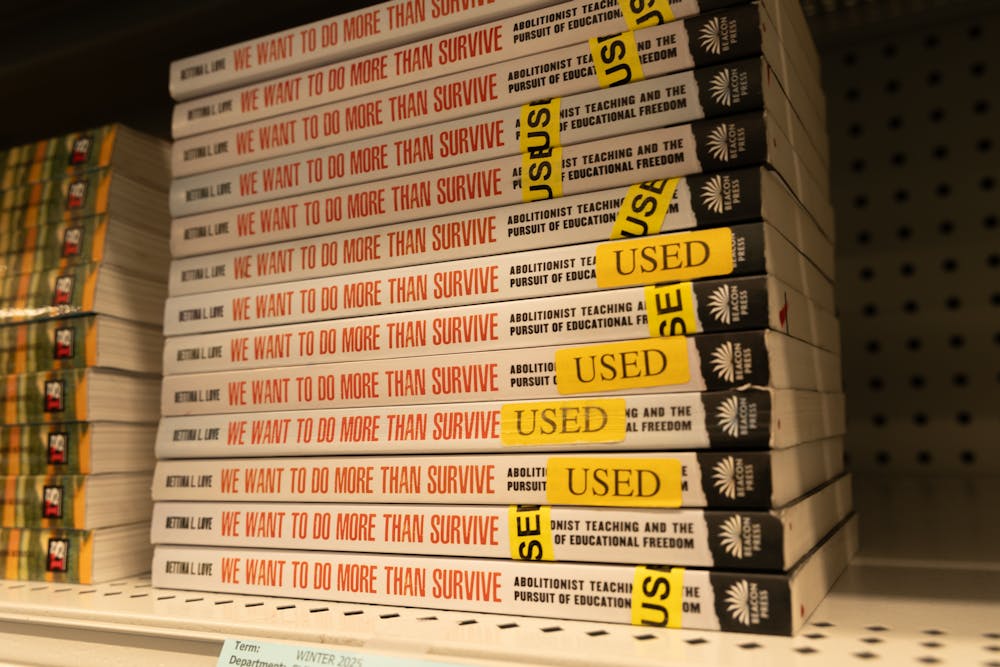With a new class comes the dreaded thought: another textbook. As Western Washington University students are preparing to register for spring classes, many face the rising cost of textbooks as an additional financial burden.
For those opting to find in-person copies of their course materials, the Western Associated Students Bookstore is their first option. Open since 1910, the bookstore has been assisting students for over a century.
“Part of my job is helping students with finding textbooks,” said Madison Rice, a staff member at Western’s bookstore.
Per the Education Data Initiative, 65% of college students skipped buying textbooks in 2024 because they were too expensive.
“I’ve only taken major classes, so not a single textbook has been required of me,” said Faith Raether, a Western design student. “Textbooks are so expensive, on top of the hundreds of dollars of paying in course fees.”
Western faculty and administrators are responding to these concerns. Digital textbooks and open educational resources (OERs) have emerged as potential solutions for those seeking to reduce expenses.
Several professors have begun adopting OERs — free, openly accessible resources that provide the same value as traditional textbooks. OERs are a variety of electronic texts and media that are published with a Creative Commons or public domain license and allow for free access to whoever needs it.
As the shift to more cost-efficient textbook access becomes more relevant, it also opens the conversation about inclusive access.
“With inclusive access, the idea is that this is a cost of education, so it can be dropped into your student account to pay when you pay tuition and other fees,” Lara Konick, Western’s bookstore director, said.
Students have long grappled with the high cost of textbooks, but recent reports show an uptick in prices, which experts attribute to factors such as publisher price hikes, supply chain issues and the ongoing rise of digital learning resources that come with their own hidden costs.
While the bookstore offers some used and rental options, students have turned to other alternatives to mitigate the financial strain.
“I think Facebook pages are super helpful,” Raether said. “The Whatcom Buy Nothing page, [and] if I still had TikTok, I would tell you TikTok.”
This surge in textbook prices has fueled conversations about the growing need for more affordable alternatives. Online marketplaces like Chegg, Amazon and the Western-specific Book Swap Facebook page have gained traction as students look for ways to offset the soaring costs.
Western’s library services have also ramped up their efforts to help students find cheaper options.
“If someone came in and said, ‘Where can I find this?’ The first thing we’d say is ‘check the library’ because often they’ll have reserves,” Konick said. “If there is a digital reserve available, then you’re not buying anything at all, you’re getting it free from the library.”
Despite these efforts, many students feel that more action is needed, particularly as textbook prices continue to rise. A 2024 report from Foghorn News said that college tuition and fees have risen over 80% in the past 12 years. Although the average eBook is 31.9% less expensive than a hard copy, the average college textbook costs roughly $105.37.
As the quarter continues, many will undoubtedly be watching closely, hoping for a shift in the way academic resources are provided — and ultimately, a more sustainable future for college students across the country.
For now, students at Western are left to navigate the complex web of options available to them — balancing between digital formats, second-hand books, rentals and online marketplaces in an effort to find the best deals.
Kaitlyn Ward (she/her) is a senior at Western. She is a newswriting & editorial journalism major getting her minor in psychology. You can most likely find her making coffee or going on hikes! You can reach her at wardk25@wwu.edu.






